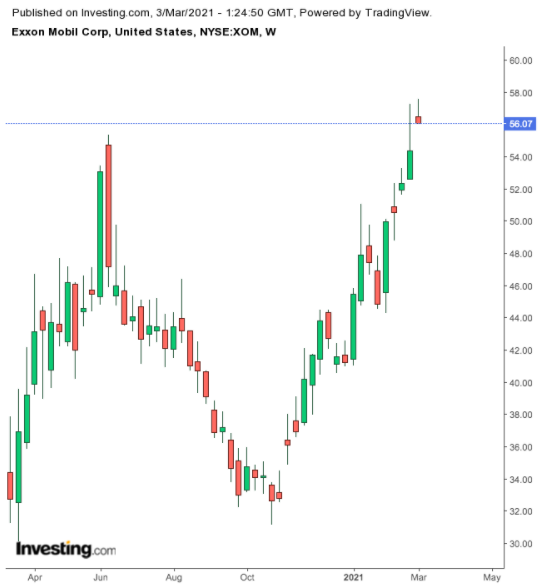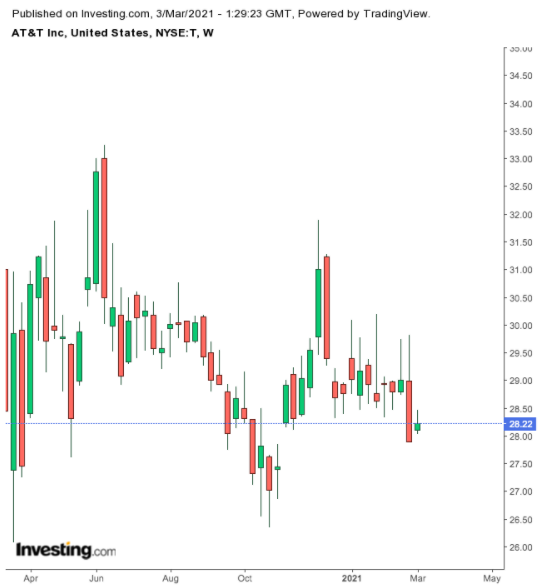
- All Instrument Types
- Indices
- Equities
- ETFs
- Funds
- Commodities
- Currencies
- Crypto
- Bonds
- Certificates
Please try another search

Exxon Or AT&T: Which High-Yield Stock Is Better For Retirement Income?

It’s not an easy environment for retirees right now. Many old-economy companies, which used to be reliable fixed income generators, are struggling during the pandemic. In addition, interest rates on guaranteed income schemes are offering close to zilch, leaving very little room for portfolios to generate cash flows.
Though the stock market has bounced back from its plunge in March last year, dividends remain depressed as companies preserve cash to deal with the economic uncertainty. According to data from Janus Henderson, global dividends fell sharply in 2020 due to the coronavirus pandemic, with the amount of investor payouts declining 12.2% to $1.26 trillion.
Even with this gloomy picture, dividends remain an integral part of any retirement portfolio. With escalating vaccine rollouts and the potential for a full reopening of the economy, this is a good time to look at some bargains in the dividend space to lock in higher yields. Today, we're focusing on the US's two best dividend paying companies to see if their payouts are safe. Let’s take a deeper look.
Exxon Mobil
After facing an extremely difficult year in 2020, when crude demand collapsed, oil and gas supermajor Exxon Mobil (NYSE:XOM) is fast regaining lost ground. Its share price has risen more than 38% this year, after plunging more than 40% during the previous year.

That turnaround is primarily due to a recovery in oil markets that brightened the outlook for global energy companies which had suffered massive losses during the past four quarters. Texas-based Exxon reported a $22-billion loss for the year—its first annual loss in at least three decades. Brent crude oil traded around $64 per barrel on Tuesday, after rebounding from less than $20 per barrel last April.
Despite facing the most challenging year in the company's history, Exxon has been able to save its $0.87-a-share quarterly dividend by borrowing from the market. Analysts now believe that the worst is over for the company and its stock, which is yielding a juicy 6.4% per annum. That offers good value for the income-seeking class.
J.P. Morgan analyst Phil Gresh cited the giant’s improved financial outlook and more reasonable valuation in a recent note to clients. He wrote:
“For the first time in seven years of covering integrated oils since the peak of the sector in 2014, we are upgrading [Exxon Mobil] to overweight.”
“As we sit here today, we think that the bar is materially lower, execution might finally be turning a corner, 2021 consensus is too low (even at $50/bbl Brent), the >7% dividend yield is more secure and valuation is more reasonable. Perhaps most importantly, we think that capital discipline is improving, with the [$20 billion to $25 billion] capex budget a self-imposed step required to preserve the dividend and balance sheet.”
CEO Darren Woods is trying to win investors by diverting capital spending to advantaged assets with the highest potential future value, including developments in Guyana and the US Permian Basin, targeted exploration in Brazil and chemicals projects to grow high-value performance products.
AT&T
America’s largest telecom operator, AT&T (NYSE:T), is another high-yielding stock that's generating a lot of interest these days. Trading at $28.31, AT&T stock now yields a massive 7.4%, paying $0.52-a-share quarterly dividend.

Though the yield looks quite attractive, especially when it comes from a company that hasn't cut its payout during the past 25 years, there are many risks associated with this kind of rich return.
First, the company is trying to turnaround its business after many unsuccessful ventures in the past decade. The wireless carrier announced last week that it’s separating DirecTV and its other US pay-TV offerings into a separately run company that will be 70% owned by AT&T and 30% owned by private equity firm TPG Capital. The transaction values the business being carved out at $16.25 billion, including debt, a fraction of the $67 billion that AT&T paid for DirecTV in 2015.
AT&T’s wireless business, on the other hand, dropped to No. 3, following T-Mobile's (NASDAQ:TMUS) acquisition of Sprint Corp. The company’s video-streaming service HBO Max, is facing tough competition from other new entrants, such as Disney+, owned by the Walt Disney Company (NYSE:DIS).
Highlighting these threats in a recent note, Wells Fargo advised investors not to buy the stock:
“In our view, T is in a difficult position as it struggles to balance investing in its core business segments (wireless, fiber-to-the-home), while deleveraging and paying a sizable dividend. This balancing act is made more difficult by continued declines in legacy business segments and the COVID-19 impact on its WarnerMedia business, which will continue to be a headwind into 2021.”
Bottom Line
Both Exxon and AT&T are risky picks for income investors, given the fast changing industries they operate in. But the current environment looks more favorable for Exxon, with oil prices rising and the reopening of the domestic and global economy further fuelling energy demand.
AT&T, on the other hand, is on a long road to recovery with its new chief executive, John Stankey, rejiggering the company’s portfolio to extract some value for investors. With a heavy debt-load and highly competitive streaming landscape, AT&T stock, in our view, carries more risk than Exxon.
Related Articles

One chart shows the details of an important historical analog for gold stocks Through many years of frustration among gold bugs due to the failure of gold stock prices to leverage...

I know there is the smell of fear in the air when I see my readership double as we reach a point where weekly chart factors come into play. Up until last week, markets have...

STAT The current bull market has been extraordinary. As Bridgewater reports, “Out of any 15-year period to be invested in equities dating back to 1970, the one we’ve just lived...
Are you sure you want to block %USER_NAME%?
By doing so, you and %USER_NAME% will not be able to see any of each other's Investing.com's posts.
%USER_NAME% was successfully added to your Block List
Since you’ve just unblocked this person, you must wait 48 hours before renewing the block.
I feel that this comment is:
Thank You!
Your report has been sent to our moderators for review





Add a Comment
We encourage you to use comments to engage with users, share your perspective and ask questions of authors and each other. However, in order to maintain the high level of discourse we’ve all come to value and expect, please keep the following criteria in mind:
Perpetrators of spam or abuse will be deleted from the site and prohibited from future registration at Investing.com’s discretion.